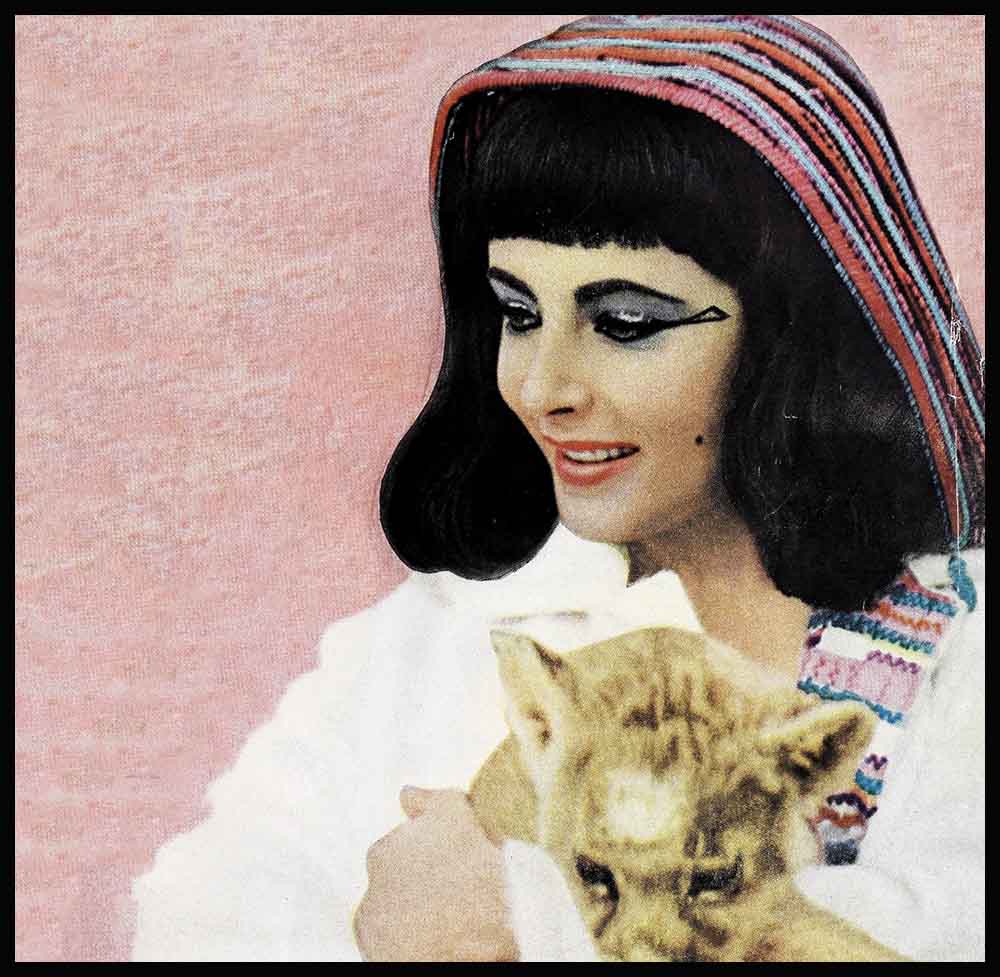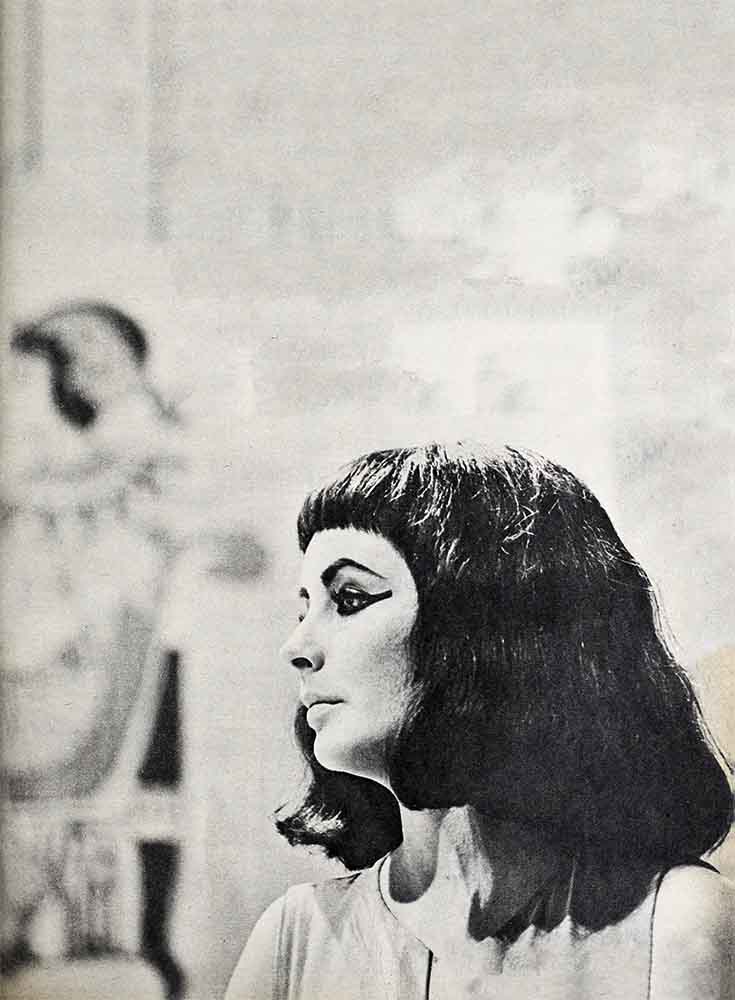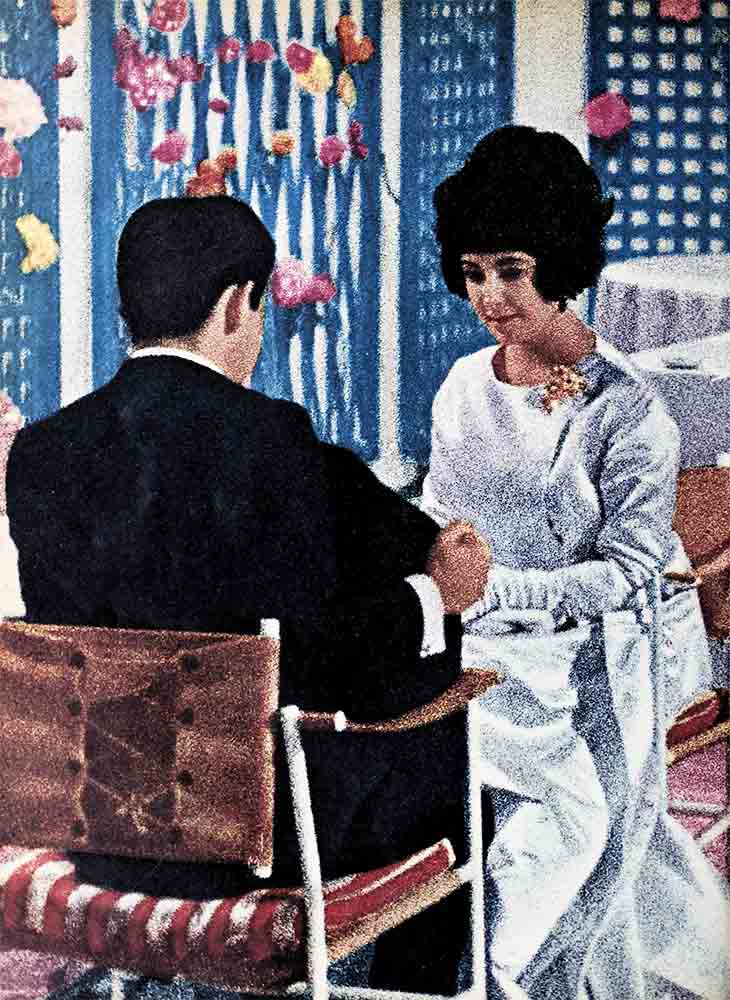
The Fascinating Story Of Elizabeth Taylor
THE OTHER WOMAN IN EDDIE’S LIFE!
Sitting straight-backed on a huge red-velvet throne, she looked every inch a Queen.
She was being shown a $100,000 wardrobe when she yawned regally and ordered it taken away. None of the dresses compared to the 22-carat gold one she was wearing that very minute. Besides, they didn’t fit to perfection. No, she’d never wear them; they’d have to be discarded and new ones ordered.
She stepped off her throne and walked over to her palatial suite followed, as always, by her hairdresser who ran a comb through her locks and a makeup man who puffed some powder on her royal nose.
And for all this she had already earned one million dollars . . . was now getting $50,000 a week . . . and even her husband was on salary for almost fifteen hundred a week.
She sighed and went back to her throne. For just this moment there was nothing to do but to sit there on her plush throne . . . and gaze out over a multi-million dollar empire that was truly her own.
It was a movie set, but right at that moment nobody was acting.
Elizabeth Taylor, anxious for the day’s work to begin, was simply being herself. Soon it would be time to start pretending she was Cleopatra. And she would have to tread the thin line that separates her from the Queen of the Nile. But that wouldn’t be too hard for, in a way, Liz really is Cleopatra.
These two women, living so many centuries apart, have enough parallels in their lives to amaze even the most casual observer. Cleopatra was called the most beautiful woman of her time. Liz is called the most beautiful woman of our time. Cleopatra tried to save Rome. Liz is trying to save a vast business—20th Century-Fox Studios. Both have been touched by disaster. Both have been hurt by love and, in a way, both destroyed their lovers.
Today, it is hard to separate the real Cleopatra from the movie queen. Everyone around Liz knows this. It touches her husband and her life with him. Perhaps it even makes their life together more difficult. Because, how do you live with two women—your wife and a queen?
And more than that: Since Liz’ life so far has been incredibly like Cleopatra’s, does it mean that she’s destined to go on following the first Queen’s star? Cleopatra was said to have been a victim of a strange love curse—a curse that destroyed everyone she loved until she finally died a tragic death.
It all began more than 2,000 years ago . . .
When Cleopatra was only eighteen she married her first husband. In keeping with the custom of that day, her husband was her brother (!), Ptolemy Dionysus XII, who was only eleven years old. After her brother-husband, whom she considered a nasty ninny, drowned, she married her still younger brother, Ptolemy XIII.
Needless to say, this marriage also didn’t work out, and Cleopatra went into exile from Egypt and married life.
Elizabeth Taylor also married for the first time when she was eighteen—not to her brother, of course, but, as is the custom with American film royalty, to a handsome, rich young man, Nicky Hilton II. The marriage lasted about as long as Cleopatra’s first marriage—eight months.
Elizabeth was hardly twenty (about the same age when Cleopatra was married for the second time) when she wed Michael Wilding. This marriage, too, failed.
It was when they turned to a third man (really the first man whom either of them loved) that the similarities between Cleopatra, Queen of the Nile, and Elizabeth, Queen of Hollywood, became amazing.
Love at first sight brought Cleopatra, the twenty-year-old Queen of Egypt, and Julius Caesar, the great Roman general, together for the first time. Caesar came, Caesar saw, and Caesar was conquered. From her he received love and the beauty of youth, as well as money to finance his expensive military campaigns; from him she received love, adoration, wisdom and strength. She made him happy and he made her Queen of Egypt.
Mike Todd was forty-nine when he met young Elizabeth Taylor at a party. He took one look at her and made up his mind. This was the girl he was going to marry. And Elizabeth? She was fascinated—more than that, hypnotized—by this coarse, tender, blunt, sensitive man.
Caesar was tall and gaunt and was losing his hair. Nevertheless, there was a forcefulness, an aura of power about him, that Cleopatra found irresistible. He believed in luck and convinced the Egyptian Queen that he would be lucky for her and she would be lucky for him.
Mike Todd’s face looked as if it had been hewn out of rough granite by a sculptor in a hurry, who had let his chisel slip a few times and hadn’t bothered to repair the damage. But his voice, like Caesar’s, was firm, and raw strength showed through everything he said or did.
Mike’s marriage to Elizabeth brought a flood of disapproval down on their heads. He was too old for her . . . he was too crude for her . . . he was too much of a gambler. And, while he was not married, he was unofficially engaged to actress Evelyn Keyes. So, on top of everything else, he was no gentleman.
But Mike laughed at the scoffers and Elizabeth laughed with him.
In all this he was following in the footsteps of Julius Caesar. Caesar, despite the fact that many in Rome considered he was committing political suicide by doing it, brought Cleopatra to Rome. Part of the disapproval of the Egyptian Queen stemmed from the fact that Caesar was already married, so he made arrangements to change the law so that he’d be permitted to have more than one wife.
But he still wasn’t satisfied. He had to do something more spectacular than anything anyone else had ever done before to show her and the people how much he loved her. And so, about two thousand years before Mike Todd dreamed up a now famous Madison Square Garden party of 18,000 guests for Liz, Caesar arranged for a mock naval battle, in which Egyptian ships rammed into one another. to be fought on an artificial lake created just for the occasion.
But it was Cleopatra who presented Caesar with a gift that outshone anything he had given her. She gave him a son.
For Mike Todd, too, his moment of ecstasy came when Elizabeth presented him with a baby, a daughter, Liza.
On March 22, 1958, Mike left Hollywood in his private plane, “The Lucky Liz,” to fly east to a testimonial dinner in his honor. Liz wanted to go with him. but Mike convinced her it was best to stay home and nurse her cold. He kissed her goodbye and promised to phone her when the plane stopped to refuel.

She never received his call. “The Lucky Liz” crashed in the mountains and Mike Todd was killed.
On the Ides of March, 44 B.C., Julius Caesar went to the Forum.
In the Forum that day death came suddenly for Caesar by stabbing.
As Cleopatra was trying to bury herself and her memories of Caesar in work in Egypt, news reached her from Rome that Caesar’s friend and comrade, Mark Antony, after delivering a funeral oration eulogizing the dead, was gathering the folds of the mantle of the dead hero around his own broad shoulders.
A remarkable fellow, this Antony, she was aware. For hadn’t Caesar himself told her all about him? An excellent soldier and capable administrator, Caesar told her. But something else, too, and this she had seen with her own eyes: He was a younger man, a handsome man. And was it not natural and fitting that in her time of grief she turn to Antony, to Caesar’s best friend, for sympathy and support?
She arranged a rendezvous with him at Cilicia, on the shores of Asia Minor. Plutarch, the Walter Winchell of the day, recorded the circumstances of their first meeting: “She came sailing up the river Cydnus, in a barge with a gilded stern and outspread sails of purple, while oars of silver beat time to the music of flutes and fifes and harps. She herself lay all alone under a canopy of cloth of gold, dressed as Venus in a picture. and beautiful young boys, like painted Cupids, stood on each side to fan her.”
A comparable meeting, if not in splendor but at least in gossip value, took place between Elizabeth Taylor and Eddie Fisher when they traveled together to Grossingers, a New York State resort, while Eddie was still married to Debbie Reynolds.
Eddie had played Antony to Mike Todd’s Caesar. They’d been best friends. Eddie had modeled himself after Mike: he talked like Mike, walked like Mike, smoked cigars like Mike did, gambled like Mike and spent money like Mike. After Mike’s death, Eddie had comforted Liz in her time of grief.
Within a few months Eddie and Liz fell in love. Eddie had left his wife and the whole world sympathized with her. Liz was labeled a sneak, an adventurer, a home-wrecker, a husband stealer and worse. In the public eye, Eddie was just a poor, befuddled man who had succumbed to the lure of a wicked temptress.

As the romance between Antony and Cleopatra also waxed hot and heavy, the public’s attention was brought to the fact that, while the Roman general was dallying with the Queen of Egypt, his wife Octavia was back in Rome crying her eyes out. Antony, too, was considered to be merely a man corrupted by an evil seductress.
And so they were married, Cleopatra to Antony, Liz to Eddie.
And for both couples, there was trouble ahead. . . .
The trouble with Antony, of course, wasn’t that he fell for Cleopatra, but that in falling for her he lost his own identity. As one historian wrote, “Antony started out by being Cleopatra’s master and ended up her slave.”
Some reports from Rome indicate that the same sort of thing may be happening to Eddie Fisher. Behind his back, some people are calling Eddie “Mr. Cleopatra.” They point out that he cancelled his Waldorf singing engagement to remain by his wife’s side, and that he receives the salary of $1,500 a week from 20th Century-Fox just to stand by to give Elizabeth moral support.
Here’s what Eddie has to say about his life with Elizabeth and the Cleopatra in her: “Liz is all woman . . . many women. She’s wife, mother, sweetheart, everything all rolled up into one. Living with her is exciting. It’s more than a love story.”
Despite his ecstasy, Eddie’s latest trouble came when his fond dream of becoming a movie producer faded. He had arranged to produce four movies—with Liz starring in two—for Warner Brothers. This would have made him not only Liz’ husband, but also her boss. Unfortunately, as of this writing, the agreement has been called off with both Eddie and Warners each taking the credit for cancelling out.
When Antony at last shook off his Cleopatra-induced languor and went forth to meet his enemies at the battle of Actium, he suffered an overwhelming defeat. Shortly afterwards, he committed suicide, in the mistaken impression that Cleopatra had died before him. She, at hearing of his death, heartbroken, took her own life.
And so the love curse triumphed over Cleopatra. Its victims? All the men she’d loved. Her brothers, Caesar, Marc Antony and, finally, even herself.
And Liz—some of her loves, too, have been victims of tragedy. Mike Wilding was a big star in England, but his career faded after he married Liz. (Ironically, his career started up again some time after the divorce.) Montgomery Clift, whom she loves like a brother, almost died in a car crash after leaving her home one night. Jimmy Dean, another beloved friend, did die in a car crash after working on “Giant” with her. Everyone knows, of course, about Mike Todd’s fatal airplane crash. As for Eddie, his career took a downward plunge when he married Liz. And Liz herself—she suffered a near fatal bout with pneumonia last year, Then, six weeks ago, she was rushed to the hospital with a severe case of food poisoning.
Does this mean that Liz is carrying on Cleopatra’s love curse?
Only time can furnish the answer.
—JAE LYLE
THE OTHER MAN IN LIZ’ LIFE!
It all started three years before Rome and “Cleopatra.” It started in Hollywood. Elizabeth Taylor, recent widow of Mike Todd and even more recently married to Eddie Fisher, was about to leave for England and “Suddenly Last Summer.” And then—as often happens just before shooting—trouble developed; script trouble, director trouble. The producers were desperate. But then one of them had an idea: “Phone New York. Get Mankiewicz. He’ll save it for us.” And—eventually—he would. . . .
During those days between the phone call and Joseph Leo Mankiewicz’ arrival in Hollywood, Liz Taylor was naturally more than a little curious to know about the man who would direct her. She’d heard of him, of course. (Seven-eight years earlier he’d been the top producer-director-writer in Hollywood. “All About Eve,” “Five Fingers,” “A Letter to Three Wives”—all big hits—were his.)
Liz knew, in the words of one critic, “Mankiewicz, bless him, is the man to whom nothing is too adult for the movies.”
“Better looking than you . . .”
She’d met him a few times. (One of the meetings had taken place at a Mike Todd party. Liz reportedly had said to her husband: “You know, Joe Mankiewicz looks like you. Mike—only he’s better looking.” To which crack Todd reportedly had answered, “Honey, how many times do I have to tell you? Nobody looks like Mike Todd. And certainly nobody’s better looking!”)
She could have checked on him, quickly, in one of those trade-book who’s whos. (She’d learn that he was born in Wilkes-Barre, Pennsylvania, in 1909; son of a professor; a graduate of Columbia College at fourteen; married in 1934 to Elizabeth Young, an actress and New York society girl, by whom he had a son, Eric, two years later and from whom he was divorced three years later; married again in 1939 to Rosa Stradner, an actress, by whom he had two sons, Christopher and Thomas.)
She’d have the basic facts.
But still, Liz might have wondered, who was he—really—this Joe Mankiewicz?
And what would he be like to work with?
Of all the answers Liz would have gotten at the time, the one that best—and most prophetically—seemed to sum up the man was this statement made by someone who knew him well.
“If you ever blank out—and forget his name—just call him Caesar. He’ll answer you without a blink. Caesar in loose-Latin means boss. And Joe is a boss-man from the word go. Not only when he’s working. But all the time . . . I remember about fifteen years ago when he and Rosa were expecting their first child. Rosa must have been in her seventh or eighth month and one day she said to Joe, I’ve decided . . . if it’s a boy, I’d like to name him Knute.’
“ ‘Knute Mankiewicz—are you kidding?’ Joe said.
“ ‘I think it’s a lovely name,’ Rosa said.
“ ‘There’ll never be such a name in this family,’ Joe said. ‘And not for my son.’
“ ‘We’ll see,’ said Rosa.
“Guess who won, Joe did—of course.” There were other answers Liz would have gotten, if she asked about Mankiewicz.
Said an old friend of his: “He’s a complicated man. He’s an elusive character. On one hand he’s aggressive, disputatious, rude. On the other hand he’s glib and humorous, a fantastic wit. He’s enormously charming and everybody likes him—though you sometimes wonder why.” Said a former secretary of Mankiewicz: “He doesn’t swear and he seldom takes a drink. He likes to eat—steak, lamb chops, broiled chicken and Kadota figs. Bring him a can of those figs some day and you’ll see how he’ll love you for the rest of your life.”

Said another old friend: “As you know, the movie industry is built largely on fear. Everybody’s afraid of somebody else. But not Joe. Joe’s not afraid of anybody. He once said of movie exhibitors: ‘They’re real estate operators whose chief concern should be taking gum off carpets and checking adolescent love-making in the balcony—instead of bothering those of us who are trying to make pictures.’ The exhibitors threatened to boycott all Mankiewicz pictures after that. But Joe didn’t care. He couldn’t have cared less.”
Among the other facts learned about Liz’ director-to-be, there was one that would cause her to place her tongue deep inside her cheek.
It came from someone who said, “He is—no matter what else anyone says about him—amazing with women. A-ma-zing.” The night before the “official” meeting between Liz and Mankiewicz, at a party, a certain chatty actress had a lot to say about the director. If Liz had heard her, she wouldn’t have been too impressed with Mankiewicz. Of course, if it had been another party, or if it was another actress doing the talking, Liz would have gotten a far different picture of the man:
Linda Darnell would have told her: “Joe’s a doll. He never shouts on the set. He never even raises his voice. He comes over and talks to you, just to you, so nobody else can hear. And he never says, ‘That’s wrong’—only, ‘Maybe it would be better this way.’ ”
Celeste Holm would have said: “He starts out by assuming you’re a professional and that you have at least reasonably good sense. This in itself can be startling. . . . Most of all, though, he’s a gentleman. And so considerate.”
Thelmer Ritter would have told Liz: “I was so nervous the first time I had to meet him. To make it worse, I’d cut a finger that morning. And when I walked in for our interview the bandage on the finger made it stick out like a barber pole. But Joe just looks at me. And then he looks at the finger and he says, ‘Did you have it wrapped for a gift, Miss Ritter?’ And so of course I fell in love with him.”
But the chatty actress didn’t say any of this. all she knew was, “Mankiewicz? Beware. He has an uncanny way with the women he works with. He once said—and this is on record somewhere—‘Most actresses are emotionally retarded.’ And do you know what? This has only endeared him to the species. Since each, of course, thought that she was the exception . . . that’s how it goes with Mankiewicz.”
And so it was that Liz’ tongue could have been practically embedded in her cheek when the meeting with Mankiewicz finally did take place that next day. But it wouldn’t remain there long.
Said someone connected with “Suddenly Last Summer,” and who was present at the meeting.
“Joe had arrived by plane that morning. He could have been tired after the all-night flight. But he wasn’t. He got to the office at about nine-thirty. Liz arrived at about a quarter-to-ten. There were handshakes, smiles. Then talk about the picture. Joe taking over, doing most of the talking. Serious talk. Brilliant talk. It was obvious to anyone there that morning that the picture would indeed be saved; that it would be a great picture. Liz, first and foremost, knew that she had nothing more to worry about.
“It was an ideal relationship Liz and Joe had going for them all during the making of ‘Suddenly Last Summer.’ And when it was over and time to exchange gifts (an old, old movie custom)—and though I don’t know for sure—Liz probably sent Joe a small jar of Kadota figs. And the note would have read:
“ ‘Hail, Elizabeth’s Caesar—to a friendship that was born.’
“And Joe—he must have fell over laughing!”
It was four years later now.
Time had passed. And things had happened. Terrible things.
For one thing, Rosa Stradner Mankiewicz had died.
And Liz, too, had nearly died.
And now she was set to make the most expensive picture of all time, and—even before it started—it was a shambles; director trouble, script trouble.
And once again the word went out: “Phone New York. Get Mankiewicz. He’ll save it for us.”
And—eventually, once more—he would.
“They met again—for the first time in years—in Hollywood, shortly before we all took off for Rome,” says a friend of both. “The meeting took place in one of those ground-floor offices in the administration building at 20th Century-Fox. It was morning. Joe arrived at about ten. Liz arrived at about a quarter-after. There were handshakes, smiles, reminiscent talk. Then talk about the picture. Joe taking over—doing most of the talking. Serious talk. Brilliant talk. Then there was lunch in the commissary. Joe, I remember, sat directly across the table from Liz. They continued talking about the picture. And then, suddenly, at one point, Joe said to Liz: ‘But you look worried. You haven’t, I hope, lost any faith in me?’
“Liz looked embarrassed. ‘If I do look worried,’ she said, ‘it has nothing to do with the picture. Believe me.’
“‘What’s wrong then?’ Joe asked.
“ ‘I’ve got to make a speech tonight,’ Liz said. ‘It’s that simple. I’ve got to write a speech . . . and make the speech . . . about my illness—the operation . . . and I know it’s going to turn out awful . . . because I’m just not a writer. Believe me, that’s what’s wrong.’
“Joe smiled. ‘You’re a smart girl, Liz,’ he said. ‘You talk well. Good writing is just like good talking . . . I don’t get the problem.’
“Liz smiled back at him. She shrugged. ‘Maybe it’s no problem for you,’ she said. ‘But I just can’t do it.’
“ ‘A few months ago,’ he said, ‘you were in London. Lying in a hospital. Dying. Tell me about it. Everything you remember. Everything you felt. Just talk. Now come on,’ he prodded her. ‘Tell me. . . .’
“As you well know, Liz delivered her speech that night at the Beverly-Hilton Hotel, one of the most touching speeches ever made, one of the most beautiful speeches ever made.
“What you may not know is that the following morning if a grateful Liz were in a fig-giving mood she would have sent him two jars of Kadota figs. And with them, a note that would have read:
“ ‘Thus, with Cleopatra’s Caesar, a friendship is reborn!’ ”
“Though to call it merely a friendship—this thing between Elizabeth and Joe,” says someone who has been working in Rome with them these past few months, “would be to understate it terribly.
“First of all they are together all day, five day s a week, while Joe directs her as Cleopatra. Then, on weekends, as Joe works on the script for the next five days’ shooting, Elizabeth is practically constantly with him—primarily, because the picture is her life now and she’s anxious to be around it at every possible moment.
“In this sense and only this sense Joe Mankiewicz is the other man in Liz’ life. There’s no doubt about it—that Cleopatra will be Elizabeth Taylor’s greatest role. And, despite her own basic talent and beauty, it will be largely Joe’s doing. The way they’ve worked it out together—that will make it her greatest role.”
Says another Rome source: “Friendship? Well, that is a beautiful enough word, and I guess you could apply it to what’s going on between Liz Taylor and Joe Mankiewicz. But I, for one, think it is more than friendship that they share. I think it is a need they share—a Creative need for one another. Joe is one of the few men left in Hollywood who’s concerned about movie-making in an artistic way. He wants to do new, exciting things on film. He wants to set his sights on something besides the jingle of coins in the box-office coffers. And Liz shares his feelings. They seem to believe that together they can make great movies— movies that say something of value and are entertaining . . . and are successful.
“And don’t forget, Liz is an actress, making the biggest picture of her life. She knows the money involved in the picture. She knows the status of her health, and how everyone is worried about it—nerverackingly worried. So sometimes she is scared. And this is where Joe comes in to help her.
“Because if Liz should have one of her rare, bad days when everything goes wrong and she might feel like a failure, Joe could say to her: ‘You can’t talk about failure, Elizabeth. Why, when I was in college, I wanted to be a doctor, you see—and when I first started college I took a course in physics and the professor gave me an F-minus. I thought to myself: But there is no such grade. So I went to the professor and I protested. He didn’t let me protest long, though. He said to me, “I feel, Mr. Mankiewicz, that I must distinguish between mere failure and total failure such as yours.” And you, Elizabeth, you talk to me of failure?’
“Needless to say, Liz would break up on that one. And the day’s shooting would go on without a hitch. . . .
“And so it’s gone with the two of them p here in Rome—Liz Taylor, Joe Mankiewicz—two artists who need each other at this time in their careers.”
—ED DE BLASIO
It is a quote. PHOTOPLAY MAGAZINE MAY 1962





No Comments